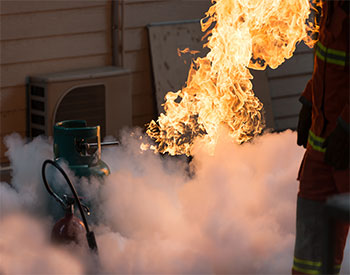
Gas tanks with fire. during training
Gas Leaks
Home Electrical Circuits
Familiarize yourself with the location of the electrical breaker panel.
Turn off breakers for areas of concern.
If in doubt, shut off the main breaker. Check your house electrical meter. If it is on your home, there may be a main disconnect breaker next to it. If the meter is on an underground service, it may be in front of your home. But there should be a main breaker where the line enters the home.
Be sure and show others in the family where the breakers are located in case of an emergency.
In case of basement flooding:
Think before stepping in any water.
A shock hazard may exist even in an inch of water.
If the electrical panel is upstairs, shut off all circuits. If the electrical panel is in the basement, determine whether it can be reached on DRY ground. If not, shut off the main breaker.
Before a Power Outage
Learn location of fuse box or circuit breaker.
Store candles, flashlights and extra batteries in convenient places.
Have food and water supplies on hand.
Know the location of all camping equipment stove, lantern, and sleeping bags. Make sure equipment is operation and that you know how to use it. Use camping equipment requiring gasoline, propane, white fuel. Coleman fuel or charcoal briquettes outside only.
Keep refrigerator well defrosted.
Purchase & install approved surge protectors for appliances and electronics.
During a Power Outage
Unplug all your electronic equipment if you do not have surge protectors. A power surge could ruin appliances when power is restored.
Turn off all but one light switch.
Open refrigerator door only to take food out, close as quickly as possible.
Use camping equipment outside six feet away from everything. Use only a fireplace properly installed wood stove or a new style kerosene heater in a safe area with fresh outside air coming into area.
Report any downed lines.
Do not allow children to carry lanterns, candles or fuel.
After the Power Outage
When power is restored, plug in appliances one by one, waiting a few minutes between each one. This will prevent overloading the system.
Be patient, energy may be first restored to police and fire departments and critical infrastructure.
Emergency Control of Gas
If you detect the smell of natural gas, leave your house immediately. Do not use any electrical device.
Check house piping, appliances and vents for damage.
Check for fires or fire hazards.
Do not use matches, lighters or other open flames.
Do not operate electrical switches, appliances or battery-operated devices if you suspect natural gas leaks. This could create sparks that could ignite from broken lines.
If gas line breakage is suspected, evacuate immediately and shut off the gas at the meter.
Wear heavy shoes in all areas near broken glass or debris. Keep your head and face protected from falling debris.
Turn on a battery-operated radio if no gas leaks are found or a car radio to receive disaster instructions.
Do not use your telephone except in extreme emergency situations.
Call Dispatch at 238-4000 from a neighbors house.
Explosions
If There is an Explosion
Take shelter against your desk or a sturdy table. Exit the building ASAP.
Do not use elevators.
Check for fire and other hazards.
Take your emergency supply kit if time allows.
Help others provide first aid as necessary.
If There is a Fire
Exit the building ASAP
Crawl low if there is smoke.
Use a wet cloth, if possible to cover your nose and mouth.
Use the back of your hand to feel the upper, lower and middle parts of closed doors.
If the door is not hot brace yourself against it and open slowly.
If the door is hot, do not open it, Look for another way out.
Do not use elevators.
If you catch fire, do not run. STOP, DROP, and ROLL, to out the fire.
If you are at home, go to a previously designated meeting place.
Account for your family members and carefully supervise small children.
Never go back into a burning building.
If You are Trapped in Debris
If possible use a flashlight to signal your location to rescuers.
Avoid unnecessary movement so that you don’t kick up dust.
Cover your nose and mouth with anything you have on hand. (Dense- Weave cotton material can act as a good filter. Try to breathe through the material.)
Tap on a pipe or wall so that rescuers can hear where you are.
If possible, use a whistle to signal rescuers.
Shout only as a last resort, shouting can cause a person to inhale dangerous amount of dust.
